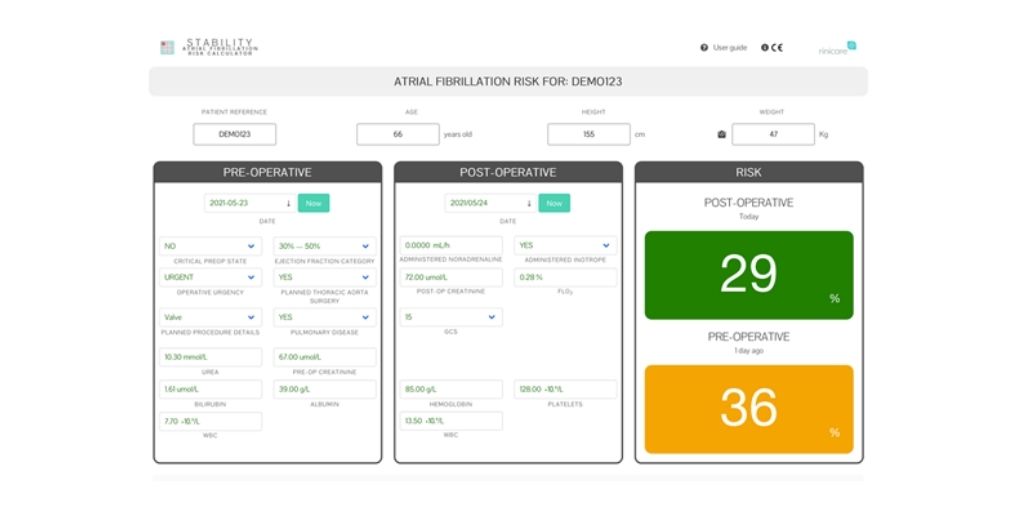
The STABILITY platform uses AI technology to provide advanced clinical risk prediction, and acts as an early warning system for patient deterioration
Manchester-based MedTech start-up Rinicare has launched a new application for its ground-breaking clinical risk prediction platform, STABILITY. The new solution is focused on highlighting patients’ risk for developing atrial fibrillation (AF), initially in those who have undergone cardiac surgery.
The STABILITY AF product will use Rinicare’s world-leading, AI-driven clinical risk prediction software to provide clinicians with an effective early warning system for AF, leading to improved patient outcomes and safety. Rinicare is currently in discussions with a number of key stakeholders about implementing STABILITY AF into critical care units around the UK, alongside its existing STABILITY UO solution.
STABILITY AF utilises routine pre- and postoperative physiological data inputted by clinicians managing patients in critical care units. Using a proprietary algorithm, STABILITY AF analyses this data and provides clinicians with an easy-to-understand risk score for how likely a patient is to develop atrial fibrillation in the near-term, informing patient management decisions for those patients. Each patient receives a preoperative risk score, and a postoperative risk score, which is updated to take intra- and postoperative events into account, allowing clinicians to quickly and accurately identify those patients most at risk.
Atrial fibrillation is the most common arrhythmia complicating cardiac surgery, and puts patients at increased risk of stroke, congestive heart failure, and haemodynamic instability. Post-operative AF (POAF) usually occurs 2-5 days after surgery, and, on average, patients with POAF typically incur $10,000–$20,000 in additional hospital treatment costs, spend 12–24 hours longer in intensive care, and have an additional 2 to 5 days in the hospital.
Rinicare’s AI-driven STABILITY platform can identify subtle signs of patient deterioration, and acts as an early warning system for clinical teams in critical care units. Highlighting patients most at risk of developing AF gives clinicians the opportunity to make earlier interventions to prevent AF developing. In addition, the STABILITY AF module also allows clinicians to identify low risk patients, potentially allowing them to be safely transitioned out of the critical care unit more quickly.
Cardiac surgery patients are a particularly high-risk patient population. Although cardiac surgery outcomes have improved significantly over recent years, there remains a significant risk of complications, and approximately 3% of patients will not survive to 30 days post-surgery. Any tool which can alert the clinical team to a developing complication before it occurs has the potential to positively impact on patient outcomes especially for conditions such as AF for which effective preventive treatments are available.
The STABILITY AF launch marks the second application for Rinicare’s STABILITY platform, following STABILITY UO (urine output). STABILITY UO employs sophisticated analysis of urine output data to predict a patient’s risk of developing renal complications or acute kidney injury following cardiac surgery, and allow for early, preventive intervention. Powered by a clinically validated algorithm, STABILITY UO’s predictive power has been shown to accurately predict dangerous episodes of low urine output that correlate strongly with increased morbidity and mortality.












